Related Research Articles

The Houston Texans are a professional American football team based in Houston. The Texans compete in the National Football League as a member of the American Football Conference (AFC) South division. The team plays its home games at NRG Stadium.
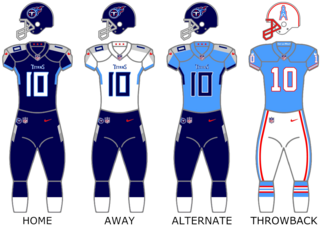
The Tennessee Titans are a professional American football team based in Nashville, Tennessee. The Titans compete in the National Football League (NFL) as a member of the American Football Conference (AFC) South division. The Tennessee Titans play their home games at Nissan Stadium; the team will move to a new stadium which will be completed in 2027.
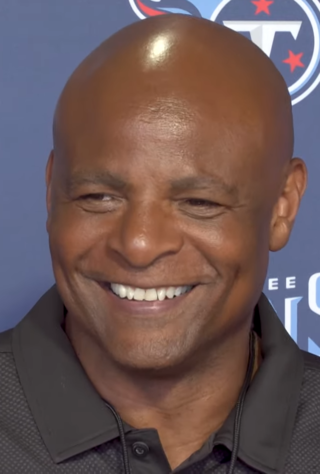
Harold Warren Moon is an American former professional football quarterback who played for 23 seasons. He spent the majority of his career with the Houston Oilers of the National Football League (NFL) and the Edmonton Eskimos of the Canadian Football League (CFL). Moon also played for the NFL's Minnesota Vikings, Seattle Seahawks, and Kansas City Chiefs. He is considered one of the greatest undrafted players in NFL history.

William Arthur Johnson, better known as Billy "White Shoes" Johnson, is an American former professional football player who was a wide receiver and return specialist in the National Football League (NFL) from 1974 through 1988. A 75th and 100th Anniversary All-Time NFL Team selection, Johnson was one of the first players to display elaborate celebrations in the end zone.

Elisha Archibald Manning III is an American former professional football player who was a quarterback in the National Football League (NFL) for 14 seasons, primarily with the New Orleans Saints from 1971 to 1982. He also had brief stints with the Houston Oilers and the Minnesota Vikings. He played college football for the Ole Miss Rebels and was inducted into the College Football Hall of Fame in 1989. Manning is the patriarch of the Manning football dynasty, having preceded sons Peyton and Eli as a successful NFL quarterback.
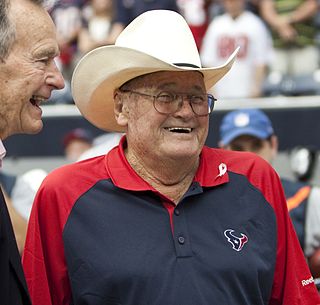
Oail Andrew "Bum" Phillips Jr. was an American football coach at the high school, college and professional levels. He served as head coach in the National Football League (NFL) for the Houston Oilers from 1975 to 1980 and the New Orleans Saints from 1981 to 1985.

Mark DeWayne Moseley is an American former professional football player who was a placekicker in the National Football League (NFL) for 16 seasons. He played for Philadelphia Eagles (1970), the Houston Oilers (1971–72), the Washington Redskins (1974–86), and the Cleveland Browns (1986). A native of Livingston, Texas, Moseley played quarterback at Texas A&M University and Stephen F. Austin State University before switching to kicker for his senior season at Stephen F. Austin.

Robert Lorenzo Brazile Jr., nicknamed "Dr. Doom", is an American former professional football player who was a linebacker in the National Football League (NFL). Brazile played from 1975 to 1984 for the Houston Oilers and was inducted into the Pro Football Hall of Fame in 2018.
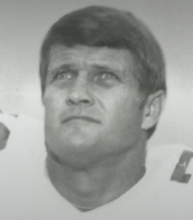
Ralph Eugene Neely was an American professional football player who was an offensive tackle for the Dallas Cowboys in the National Football League (NFL). He played 13 seasons and 172 games for the Cowboys from 1965 to 1977.
The 1960 NFL draft in which NFL teams take turns selecting amateur college American football players and other first-time eligible players, was held at the Warwick Hotel in Philadelphia on November 30, 1959. Many players, including half of those drafted in the first round, signed with teams in the newly created American Football League, including the first overall pick and Heisman Trophy winner Billy Cannon. At the time of the draft, the Cardinals were still the Chicago Cardinals; they moved to St. Louis in March 1960. The Dallas Cowboys were enfranchised in January 1960 after the draft.
Gordon Scott Appleton was an American football defensive tackle in the American Football League (AFL) for the Houston Oilers, San Diego Chargers and Oakland Raiders. He played college football at the University of Texas, which won the national championship in 1963. Appleton was a consensus 1963 All-American and won the Outland Trophy.
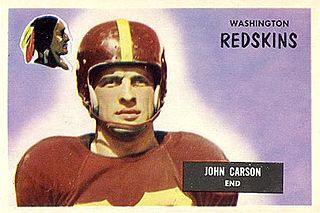
Johnny Richard Carson Sr. was an American professional football player who was a tight end for the Washington Redskins of the National Football League (NFL) from 1953 to 1959. He also played for the Houston Oilers of the American Football League (AFL) during their inaugural season in 1960. He played college football for the Georgia Bulldogs, earning first-team All-American honors in 1953. Carson was selected in the 15th round of the 1953 NFL draft by the Cleveland Browns.
Ernest Pastell Givins Jr., is an American former professional football player who was a wide receiver for 10 seasons in the National Football League (NFL), primarily with the Houston Oilers.
Elvis Zaring Peacock is an American former professional football player who was a running back for the Los Angeles Rams of the National Football League (NFL) from 1978 through 1980.

The 1991 Houston Oilers season was the 32nd season and their 22nd in the National Football League (NFL). Haywood Jeffires would become the second Oiler to have 100 receptions in a season. The first Oiler to accomplish the feat was Charley Hennigan in 1964. Jeffires would be the fifth receiver in NFL history to have a 100 reception season. The Oilers scored 386 points and gave up 251 points. The franchise earned its first division title since the AFL-NFL merger, having last won a division title in the 1967 American Football League season. The franchise finished the season with 11 wins compared to 5 losses and appeared twice on Monday Night Football.

The 1996 Houston Oilers season was the 37th season overall and 27th with the National Football League (NFL) and their final season in Houston. The team bested their previous season's output of 7–9, but failed to qualify for the playoffs for the third consecutive season. The Oilers only won two out of their eight games at home. However, on the road they won six out of eight games as the Oilers finished with an 8-8 record. Houston running back Eddie George won the Offensive Rookie of the Year with 1,368 yards rushing. Despite finishing 8–8 record, the Oilers failed to sell out any of its home games at the Houston Astrodome for the second consecutive season.

The 1995 NFL season was the 36th overall season of the Houston Oilers and their 26th with the National Football League (NFL). Their 7–9 record bested their previous season's output of 2–14, but they failed to qualify for the playoffs for the second consecutive year.
The 1984 Houston Oilers season was the 25th season overall and 15th with the league. The team improved upon their previous season's output of 2–14, winning three games, but failed to qualify for the playoffs for the fourth consecutive season. With hopes of improving the offense the Oilers won the bidding war to sign CFL star and future Hall of Fame quarterback Warren Moon. However, with Earl Campbell in full decline, the Oilers decided to trade him to the Saints after a 1–5 start. The move would leave a gaping hole at running back, but it was the defense that was a greater weak spot as the Oilers finished with a 3–13 record, allowing 457 points on the season.

The Houston Oilers were a professional American football team that played in Houston, Texas, from its founding in 1960 to 1996. The Houston Oilers began play as a charter member of the American Football League (AFL) and won two AFL championships before joining the NFL in the AFL–NFL merger of the late 1960s.
References
- ↑ "JOHNNY PEACOCK". profootballarchives.com. Archived from the original on September 7, 2014. Retrieved September 6, 2014.